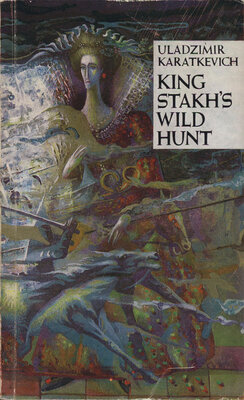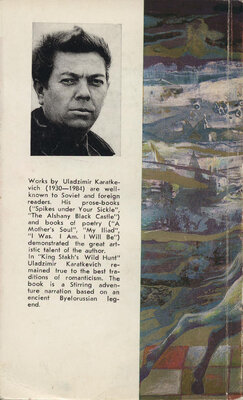King Stakh's Wild Hunt
Уладзімір Караткевіч
Выдавец: Мастацкая літаратура
Памер: 248с.
Мінск 1989
She went over to the staircase crying bitterly. I followed after her. We went upstairs to the room where that closet was, and I stopped in surprise. Yanowskaya in a white dress with a candle in her hand was standing before us. Her face was sad, and she looked at the housekeeper with disgust.
“Mr. Belaretzky, I heard your talk accidentally, heard it from the very beginning. I had followed in your footsteps. At last I’ve learned the meaning of low-down actions and the depth of one’s conscience. And you...” she turned to Zakrevskaya, standing aside with head lowered, “you can remain here. I forgive you. With difficulty, but I forgive you. And you, Belaretzky, forgive her. Stupid people should sometimes be forgiven. Because... Where will she go from here? Nobody needs her, a foolish old woman.”
A tear rolled down from her eyelashes. She turned round and left. I went after her. Yanowskaya stopped at the end of the corridor and said quietly:
“For the sake of these papers people cripple their souls. If my ancestors hadn’t forbidden it, how gladly I should have given this mouldy old house to somebody. This house, and also my name, are a torture for me. If only I could die soon. Then I’d leave it to this woman with a heart of stone and a stupid head. Let her be happy if she is able to creep on her belly for the sake of this junk.”
In silence we went down into the room on the lower floor and over to the fireplace. We stood there looking at the fire, and its crimson reflections fell on Yanowskaya’s face. In the last few days she had changed noticeably, perhaps she had grown up, perhaps she was simply coming into womanhood. I hope no one besides myself had noticed this. I was the only one to see that life was warming up as yet unoticeably in this pale sprout growing underground. Her look had become more meaningful and inquisitive, although a chronic fear lay on her face like a mask as formerly. She had become a little livelier. For some reason the pale sprout had come to life.
“It’s good to stand like this, Miss Nadzeya,” I said pensively. “A fire burning...”
“A fire... It’s good when it is made, when it burns. It is good when people don’t lie.”
A wild cry, an inhuman cry, reached us from the yard — it seemed that a demon screamed and sobbed, not a human being. And immediately following this cry, we heard a steady, mighty thundering of hoofs near the porch. And the voice sobbed and screamed so terrifyingly
that it could not have come from out of the breast of a human being.
“Roman of the last generation — come out! It’s revenge! The last revenge!”
And something else screamed, something nameless. I could have run out onto the porch, could have shot at these dirty, wild swine and laid down on the spot at least one of them, but in my arms lay Nadzeya, and I felt the beating of her frightened litte heart through her dress, felt how it was gradually dying out, beating perceptibly less and less often. Frightened for her life, I began to stroke her hair timidly. Slowly she regained consciousness and her eyelashes imperceptibly began to quiver at the touch of my hand on her head. In such a way a frightened puppy accepts the caress of a person who pats it for the first time: its eyebrows quiver, expecting a blow each time the hand is raised.
The thunder was already retreating and my entire being was ready to jump out on the porch together with her, shoot at those bats, and fall down on the steps together with her and die, feeling her at my side, all of her here at my side. In any case, to go on living like this was impossible.
And the voice was sobbing already from far away in the distance:
“Roman! Roman! Come out! Under the horses’ hoofs with you! Not now, not yet! Afterwards! Tomorrow! Afterwards! But come we will! We’ll come!”
And silence. She lay in my arms. It seemed as if quiet music had begun playing somewhere, perhaps in my own soul. Quietly, so quietly, far, far away, gently: about sunshine,
about raspberry-coloured meadows under glistening dew, about nightingales’ merry songs in the tree-tops of far-away lindens. Her face was calm, like that of a sleeping child. Here a sigh broke out, her eyes opened, she looked around in surprise, became severe.
“I beg your pardon, I’ll leave.”
And she made her way to the staircase leading to the second floor — a white little figure.
It was only now, trembling with excitement, that I understood how courageous, how strong was her soul, if after such nerve-wracking experiences she had gone out to meet me and twice opened the doors: once when I, a stranger, arrived here, and once when I ran up to her doors, alarmed by the thundering hoofs of the Wild Hunt under her very windows. Most likely it was the Hunt and the dark autumn nights that had impelled her to do that, as does a trustful feeling compel a hare hunted down by dogs, to press itself against the feet of an accidental passerby. This girl had very good nerves if she had endured this life here for two years.
I sat down at the fireplace and began looking at the flames. Yes, the danger was a terrible one. Three persons against all those dark forces, against the unknown. But enough of sentimentality! It was near the Giant’s Gap that they came into the park. Tomorrow I would be lying in wait for them there. My hands were shaking: my nerves were strung to the utmost. And in general my state was worse than a dog’s.
“Perhaps I should leave this place?”— stirred a belated thought, an echo of that night of mine, that "night of frights”, and it died under the pressure of despair, under an iron determination and the desire to fight.
Enough! Victory or the Giant’s Gap — it’s all the same.
Leave? Certainly not! I could not leave this loathsome, cold house, because she lived here, she whom I had fallen in love with. Yes, fallen in love with. Nor was I ashamed of it. Up till now, in my relations with women, there were equality and comradeship, sometimes there was an admixture of some incomprehensible aversion, as is the case with any man, morally uncorrupted, lacking excessive sensuality. That’s how it is with many men, probably until the real thing comes. It had come. Go away? Here I was at her side, big and strong (my inner hesitation did not concern her), she depended on me, she was sleeping peacefully now, probably for the first time.
This time when I held her in my arms, was a decisive one. It decided everything for me that had been accumulating in my heart ever since the time when she rose in defence of the poor, there on the upper floor, at the fireplace. With what joy would I take her away from here, take her somewhere far away, kiss these eyes which were red with weeping, these little hands, take her under my warm, dependable wing, forgive the world its lack of shelter.
But what am I to her? No matter how bitter the thought, but she will never be mine. I have nothing to my name. She is also poor, but she belongs to one of the oldest families, is blueblooded, backed by that “proud glory of endless generations”. “Proud glory?” I knew it now, this proud glory that had come to a wild end, but that did not make things any the easier for me. I am a plebian. Yes, I’ll keep silent about this. Nobody shall ever reproach me, nor ever say that I had for the sake of money married
into an ancient family, for whom perhaps some antecedant of mine had died somewhere on the battle-field. Nor shall anybody say that I married her taking advantage of her helplessness. The only thing that I can do for her sake is to lie down in the grave, give up my soul for her sake and somehow, to some extent, repay for the radiance of the untold happiness that has brightened my soul this gloomy evening at this large, unfriendly fireplace. 1 shall help her to escape — that’s all.
I shall be true, forever be true, to this joy mixed with pain, to the bitter beauty of her eyes, and shall repay her with kindness for her thinking well of me. And then — end all. I shall leave this place forever, and the roads of my country shall lie before me in an endless chain, and the sun shall rise in iridescent circles made by the tears quivering on her eyelashes.
CHAPTER THE TENTH
The following day Svetilovich and I were on our way to a rather small island near the Yanowsky Forest Reserve. Svetilovich was in a very merry mood, talked at length about love in general and about his own in particular. And how pure and sincere the look in his eyes, so naive and childish his love, that I mentally promised myself never to stand in his way, never to interfere with him, but to clear the way for him to this girl whom I, too, loved.
We Byelorussians can rarely be in love without sacrificing something, and I was no exception to this rule. We usually torment her whom we love and even to a greater degree ourselves, because of conflicting thoughts, questions and
deeds, which others easily manage to bring to a common denomination.
Svetilovich had received a letter from the city containing information about Berman.
Oh, Berman... Berman. A fine bird he turned out to be. Comes of an old family, but now impoverished and strange. The letter states that all of them had an irresistable inclination for solitude, were quite noxious and unsociable. His father was deprived of a fortune; he had embezzled an enormous sum of money, and managed to save himself by losing a large sum of money to the inspector. His mother lived behind curtained windows almost all the time, went out for a walk at dusk only.
But the most surprising personality was Berman himself. He was reputed as being an exceptionally fine authority on ancient wooden sculpture and glassware. Something unpleasant had occurred several years ago. He had been sent to Mnikhavichy by the Amateur Antiquity Society which was headed by Count Tyshkevich. The old Polish Roman-Catholic Church was being shut down there and, according to rumours, the sculptures in it were of great artistic value. Tyshkevich had his own private museum and he wished to purchase these sculptures for it, for he was handing his museum over to the city as a gift. Berman went to Mnikhavichy, sent Tyshkevich a statue of St. Christopher and a letter in which he wrote that the sculptures in the church were of no value whatsoever. He was taken at his word, but after some time had passed, it accidentally became known that Berman had bought all the sculptures, all in all 107 figures, for a miserly sum of money and had sold them to another private collector for a large sum of money. Simulta
 КНІГІ ОНЛАЙН
КНІГІ ОНЛАЙН


